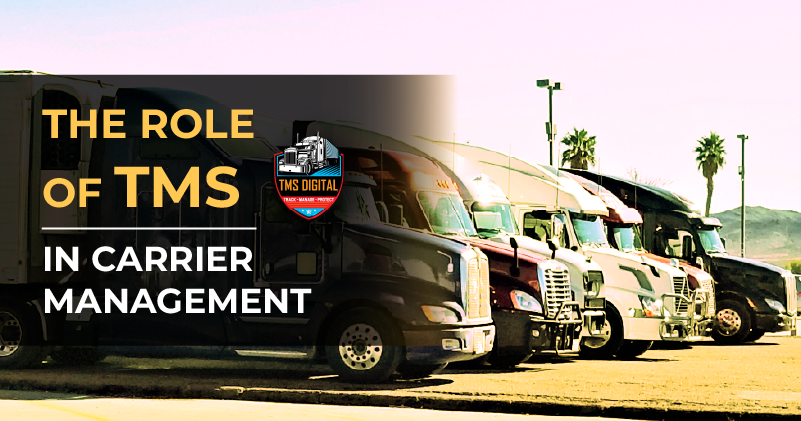
In the dynamic landscape of modern logistics, effective carrier management is a cornerstone for businesses striving to streamline their transportation operations. As the demands for efficient freight movement continue to escalate, organizations are increasingly turning to advanced solutions such as Transportation Management Systems (TMS) to navigate through the complexities of carrier management.
In this blog, we delve into the pivotal role that TMS plays in optimizing carrier management processes. From defining the significance of carrier management to exploring the intricacies of TMS functionalities, this introductory section sets the stage for a comprehensive exploration of how TMS revolutionizes transportation logistics.
Definition and Importance of Carrier Management
Carrier management encompasses the strategic planning, execution, and oversight of relationships with transportation providers to ensure the seamless movement of goods from origin to destination. It involves activities such as carrier selection, negotiation, performance monitoring, and collaboration, all aimed at achieving cost-effectiveness, reliability, and customer satisfaction.
Transportation Management Systems (TMS) are software platforms designed to automate and optimize various aspects of transportation logistics, including carrier management, route planning, freight optimization, and shipment tracking. TMS solutions leverage advanced technologies to streamline processes, enhance visibility, and empower businesses with data-driven insights for informed decision-making.
The Impact of TMS on Carrier Management
Transportation Management Systems (TMS) have revolutionized carrier management practices, offering myriad benefits and transforming how businesses navigate the complexities of logistics operations.
- Enhanced Visibility and Control: TMS provides real-time visibility into shipment status, carrier performance, and transportation costs. This enhanced visibility allows businesses to proactively identify issues, optimize routes, and make informed decisions to improve efficiency and customer service.
- Streamlined Communication and Collaboration: TMS facilitates seamless communication and collaboration between shippers, carriers, and other stakeholders. With centralized platforms for sharing information, managing documents, and tracking shipments, TMS eliminates communication barriers and fosters closer partnerships with carriers.
- Optimization of Carrier Selection and Routing: TMS utilizes advanced algorithms and optimization techniques to analyze factors such as carrier rates, transit times, and capacity constraints. By intelligently selecting carriers and optimizing routes, businesses can minimize costs, reduce transit times, and enhance service levels.
- Real-time Tracking and Monitoring: TMS offers robust tracking and monitoring capabilities, allowing businesses to track shipments in real time, receive alerts for delays or exceptions, and proactively address issues. This real-time visibility enables proactive problem-solving and enhances customer satisfaction by providing accurate delivery updates.
- Data Analytics for Performance Evaluation and Decision Making: TMS generates comprehensive data and analytics on various aspects of transportation operations, including carrier performance, costs, and transit times. By leveraging this data, businesses can conduct in-depth performance evaluations, identify trends, and make data-driven decisions to optimize carrier management strategies.
The impact of TMS on carrier management extends far beyond mere automation. It empowers businesses with actionable insights, streamlined processes, and enhanced collaboration, driving efficiency, and excellence in transportation logistics.
Implementing TMS for Effective Carrier Management
Implementing a Transportation Management System (TMS) is a strategic endeavor that requires careful planning, collaboration, and execution. To harness the full potential of TMS for effective carrier management, businesses must navigate through various implementation considerations and best practices.
-
Assessing Organizational Needs and Objectives:
- Conduct a comprehensive assessment of current transportation processes, challenges, and goals.
- Define clear objectives for TMS implementation, such as cost reduction, improved service levels, or enhanced visibility.
-
Selecting the Right TMS Solution:
- Evaluate TMS solutions based on features, scalability, integration capabilities, and ease of use.
- Consider factors such as deployment options (cloud-based vs. on-premise), vendor reputation, and support services.
-
Integration with Existing Systems and Technologies:
- Ensure seamless integration with existing ERP systems, warehouse management systems (WMS), and other relevant technologies.
- Collaborate closely with IT teams and solution providers to streamline integration processes and minimize disruptions.
-
Training and Change Management:
- Provide comprehensive training programs for users and stakeholders to familiarize them with TMS functionalities and workflows.
- Implement change management strategies to address resistance, encourage adoption, and facilitate a smooth transition to the new system.
-
Continuous Improvement and Adaptation:
- Establish mechanisms for ongoing evaluation and optimization of TMS performance.
- Solicit feedback from users and carriers to identify areas for improvement and implement enhancements accordingly.
- Stay abreast of industry trends and technological advancements to adapt TMS capabilities to evolving business needs.
Best Practices for Optimizing Carrier Management with TMS
To maximize the benefits of Transportation Management Systems (TMS) in carrier management, businesses can implement several best practices aimed at enhancing efficiency, reducing costs, and improving service levels.
-
Establishing Key Performance Indicators (KPIs):
- Define relevant KPIs such as on-time delivery rates, transportation costs per mile, carrier performance metrics, and customer satisfaction scores.
- Regularly monitor and analyze KPIs to track performance, identify areas for improvement, and drive continuous optimization.
-
Leveraging Automation and Artificial Intelligence:
- Utilize automation features within TMS to streamline repetitive tasks such as carrier selection, rate negotiation, and invoice processing.
- Explore the use of artificial intelligence (AI) and machine learning algorithms to optimize routing, predict demand patterns, and enhance decision-making in carrier management.
-
Cultivating Strategic Partnerships with Carriers:
- Foster collaborative relationships with a select group of carriers based on performance, reliability, and alignment with business objectives.
- Negotiate mutually beneficial contracts and service agreements that incentivize carriers to provide high-quality service and support business goals.
-
Regular Evaluation and Benchmarking:
- Conduct periodic evaluations of carrier performance against established benchmarks and service level agreements (SLAs).
- Benchmark carrier performance and rates against industry standards and competitors to identify opportunities for improvement and cost savings.
Conclusion
As businesses strive to optimize their transportation operations and enhance carrier management processes, the role of Transportation Management Systems (TMS) has become increasingly indispensable. TMS solutions offer a robust suite of features and functionalities that empower organizations to streamline operations, improve visibility, and drive efficiency in transportation logistics.
Among the pioneers in TMS solutions providers in the US, TMS-Digital stands out as a leader in the field of supply chain and carrier management. With its innovative technologies, comprehensive services, and industry expertise, TMS-Digital has been instrumental in helping businesses transform their transportation operations and achieve strategic objectives.
By implementing best practices, leveraging automation and AI, and cultivating strategic partnerships with carriers, businesses can unlock the full potential of TMS to drive operational excellence and achieve competitive advantage in today’s dynamic logistics landscape.
Ready to optimize your carrier management with TMS-Digital? Contact us today to learn more about our innovative solutions and how we can support your transportation logistics needs.










